The Humping of Larry King
By Larry King’s estimate, Jack Hanna’s January 11, 2001 appearance on Larry King Live was at least his twenty-fifth. The director emeritus of the Columbus Zoo, a veteran on the talk show circuit, had also regularly appeared on Letterman for years.
On this night, Hanna brought with with him a menagerie, including a black-and-white ruffed lemur, a Rhinoceros Hornbill, an arctic fox, a sea lion and a Bengal tiger. He also brought an obsidian-faced monkey named Pete. King, arms crossed, greeted Pete. “What’s happening, baby?” Pete then dry-humped Larry King’s right arm.
Larry, what happened?
Jack Hanna had appeared many, many times on Larry King Live. He was a delightful guest. In fact, one time, a poisonous toad jumped on my son, who was on the show with me. My son went nuts. I guess he was seven. And he screamed, “Get me out of here!” and he jumped up. It was just wild.
You know, when you do shows with live animals — we’ve done many — you never know what’s gonna happen. I had a crazy bird fly across the studio once and land on my shoulder. But there was nothing like that monkey. I mean, to me, it proved Darwin. It was — I don’t want to say breathtaking — one of the rare moments in my fifty-seven years in broadcasting that totally shocked me.
I love dogs. I have a wonderful dog. But I’m not an animal freak. Zoos don’t flip me, you know what I mean? I respect the world of animals. I appreciate it. Jack Hanna’s a wonderful man. My daughter went with him on an expedition in Africa. I always trust him. I trust him around animals. He’s a delightful guy.
That experience — I don’t think of it much. You reminded me. I haven’t thought of it in a while. But yes, let’s hope it doesn’t happen again. I’m eighty years old now. I’m doing a show now on the Internet, distributed by Hulu. I’m having a great time. Still doing interviews. We are scheduling an animal show on Hulu! Sometime in early April. Let’s put it this way: I don’t want a monkey.
Had a guest ever tried to hump you before?
Never. In fact, I don’t think anyone’s ever tried to hump me. I’ve had a fortunate life with females, but I was usually the humper, as I remember it. In the old days. Never had that. Nope! Nope! I plead innocent.
The Symbiote
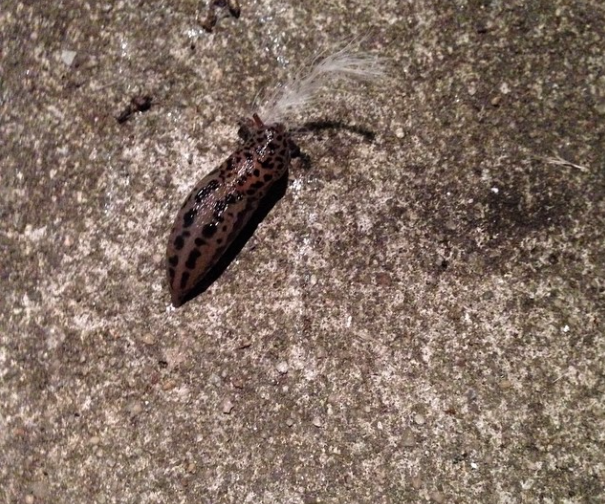
My mother, who had been dead for seven years by the time Zelda popped onto the planet, gave me the single best piece of parenting advice I have ever received: “Even babies need privacy sometimes.” At the time, my baby brother was happily playing in his crib, and I wanted to get him out to play with me. “Let him be,” she said. “He’ll want your attention soon enough. Babies learn things when they’re alone.”
The last time that I was truly alone was the day that I found out I was pregnant. Just for a minute, only I knew that I was going to have a child. Even a minute later, after my husband knew, not much changed. For months, carrying Zelda around felt like the greatest secret ever. I smiled to myself on the subway and in crowds. As Zelda grew, I felt myself becoming attached to her, even though I didn’t know anything about her yet. The first time I saw her face on a sonogram, I thought to myself, “Ah, there you are.” Being alone — “I” — suddenly meant something different than it had for the first thirty-five years of my life: It now meant “Zelda and I.”
This has its upsides. Though Zelda has, it seems, finally come to understand that we are separate beings, if I lie down on the floor she will still laugh hysterically and crawl over onto me, a little alien returning to its pod. She seems to instinctually feel at home with me — on top of me, drooling into my mouth. Physical proximity is not a question or an invitation; it is her place, her home. It would be an understatement to say that she is an extension of myself: She is a part of me grown whole, able to breathe and think for herself. We are both at our happiest together.
But not always. Newborn babies wake up screaming a lot of the time. It’s as if they go from a dead snore to full on alertness with no drowsy in between, and it’s arresting to anyone within a half a mile. But as Zelda crossed the two-month mark, now sleeping alone at night in her crib, she began to form the waking routine she follows to this day: Like I do. Slowly. Without a need to be bombarded, without a need for instant sustenance or care.
Rather than waking up crying, she began to wake up mumbling, laughing, and babbling to herself, smiling. I decided to allow her this time to herself, though my instinct was to rush to her. Even when I was excited to see her, I decided to let her be awake, just lying there, alone. At first, maybe just five minutes would pass before she began fussing and then crying, signalling that it was time to begin our day. As she learned to roll over, to grab her toes, to “talk” to herself, and then to sit up, the time lengthened. Now she is often awake and alone for half an hour or more before I go in to her.
I’ve learned the hard way how important that time truly has become for her. Occasionally I misinterpret the sounds. I hear her babbling and it has an insistent tone to it, I think. I go into the dark room, and there she is, cuddled tightly against the side of her crib, talking to herself, eyes still closed. She lifts her head, her heavy sleepy eyes blinking around, confused at my presence. It takes her sometimes a minute to get her bearings, and to smile at me, happy that I am there; I’ve interrupted her.
I know now from observing my daughter that she has acquired most of her basic skills while she is left alone, in the space of the early morning between waking and starting her day with me. I watched her struggle to roll over on the baby monitor. I watched her up on all fours, rocking back and forth ready to launch herself into a crawl. I have heard her mumbling to herself in her sleep: first, unintelligible sounds, then noises that are not words but that seem to be communications, but only with herself. She is figuring it out, and she is doing it, for a short period each morning, alone.
And of course at night, she is alone too. I read her book to her, and then lights off, I’m out, away for the night. Once she had the sleep training down, she was often asleep before I left the room, but these days, she sometimes quietly (or not so quietly) babbles herself into oblivion.
I get it. I need space too. Over time, Zelda and I have silently agreed to take more breaks from one another. At around five months old, after I hadn’t been away from her for more than an hour or two — and that long, only twice — she started to signal that for short periods she would rather be left alone. She began to seem mildly bored with me, craning her neck around to look for new faces at home and abroad. She wanted new things — other people, other scenarios — but also quieter ones, which didn’t always include me. I decided not to let her want of space sting me too much — to be proud of her and give her the independence she seemed to want.
In those spaces when we are not together, I think of her, but also, sometimes now, I allow myself to not think of her. I hope that sometimes, she doesn’t think of me. I’ll never be alone again, but it’s good to be by myself.
THE PARENT RAP is an endearing new column about the fucked up and cruel world of parenting.
Flying Lotus (Feat. Krayzie Bone), "Medication Meditation"
Where do songs come from? Some appear alone. Others are willed into existence by better, sturdier songs that need help filling an album. Some songs come from ads. Other songs have just always been there. Some songs seem to go straight to Muzak, and you ask: Was this ever on the radio? Yes, you are told, but nobody can remember exactly when. Finally, a few songs are commissioned for fake radio stations that only broadcast inside video games. This is one of those!
About That Kool-Aid
Julia Scheeres, on writing about the Jonestown Massacre.
The more I understood what actually transpired in Jonestown, the more offended I became by the notion that Jones’ victims “drank the Kool-Aid.” I felt a duty to defend them, to tell the true story of what happened in Jonestown…
That unfortunate phrase has worked its way into the cultural lexicon, but few young people know of its Jonestown origins or how offensive it is to Jones’ victims…
As you’d imagine, the phrase offends survivors. It reduces a mass tragedy to the level of banality…
Is it time to stop using the phrase, “drink the Kool-Aid”? Setting aside questions of sensitivity and appropriateness and how long, the answer to this specific question is no. The time to stop making this joke would have been the first time someone made this joke — if it’s inappropriate or hurtful now, which is hard to deny, then if anything it was more hurtful yesterday, last year, and thirty years ago. I suppose you could argue that it has always been time, and therefore it is technically still t — [A MAN DRESSED AS A LAPTOP BURSTS THROUGH THE WALL AND SHOUTS:]
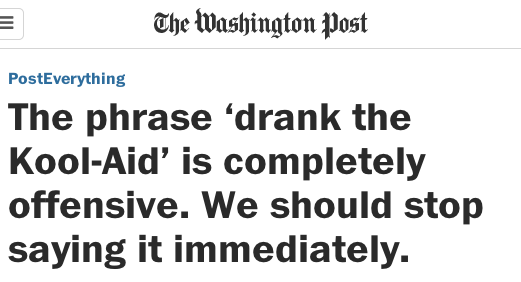
New York City, November 17, 2014

[No stars] Rain dripped on the pigeons, but they kept pursuing their pigeon-business. The ambient morning air was not necessarily cold, but the rain settled the question. Paper garbage was dissolving to pulp. From Houston Street, there was no Empire State Building uptown, and nothing much taller or more distant than City Hall downtown. By early afternoon the rain was a saturating downpour, as heavy as a summer storm, sending bubbles down the flooded gutters. Deep flowing water stretched away from the curbs for a yard, two yards. Headlights coming up Lafayette caught the spatter of the rain hitting the sheeted water. The least presentable everyday canvas sneakers were now demoted to be the rain-soaked ones, chilly and sloshing, nearly sliding out from under the body with a hasty step into a wet-floored subway car.
Statements That Sound Transparently Ridiculous When Delivered by an Avatar That Is Literally a...
Statements That Sound Transparently Ridiculous When Delivered by an Avatar That Is Literally a Picture of Money, In Order
1.
1/ Emil’s comments at the recent dinner party were terrible and do not represent the company.
— travis kalanick (@travisk) November 18, 2014
2.
2/ His remarks showed a lack of leadership, a lack of humanity, and a departure from our values and ideals
— travis kalanick (@travisk) November 18, 2014
3.
3/ His duties here at Uber do not involve communications strategy or plans and are not representative in any way of the company approach
— travis kalanick (@travisk) November 18, 2014
4.
4/ Instead, we should lead by inspiring our riders, our drivers and the public at large.
— travis kalanick (@travisk) November 18, 2014
5.
5/ We should tell the stories of progress and appeal to people’s hearts and minds
— travis kalanick (@travisk) November 18, 2014
6.
6/ We must be open and vulnerable enough to show people the positive principles that are the core of Uber’s culture
— travis kalanick (@travisk) November 18, 2014
7.
7/ We must tell the stories of progress Uber has brought to cities and show the our constituents that we are principled and mean well
— travis kalanick (@travisk) November 18, 2014
8.
8/ The burden is on us to show that, and until Emil’s comments we felt we were making positive steps along those lines
— travis kalanick (@travisk) November 18, 2014
9.
9/ But I will personally commit to our riders, partners and the public that we are up to the challenge
— travis kalanick (@travisk) November 18, 2014
10.
10/ We are up to the challenge to show that Uber is and will continue to be a positive member of the community
— travis kalanick (@travisk) November 18, 2014
11.
11/ And furthermore, I will do everything in my power towards the goal of earning that trust.
— travis kalanick (@travisk) November 18, 2014
12.
12/ I believe that folks who make mistakes can learn from them — myself included.
— travis kalanick (@travisk) November 18, 2014
(Context.)
Shit Sniffed
“When you’re working in a really tiny space, building a communication tool and trying to express an idea for people who are going to look at it for fractions of a second, you’ve got to be really ruthless with how clear you are. My greatest contribution is probably the little flies flying around the poop [emoji]. It brings it to life. It’s timeless. You could smell it. It’s in this moment.”
Election Season in Sierra Leone
by Connor Wroe Southard
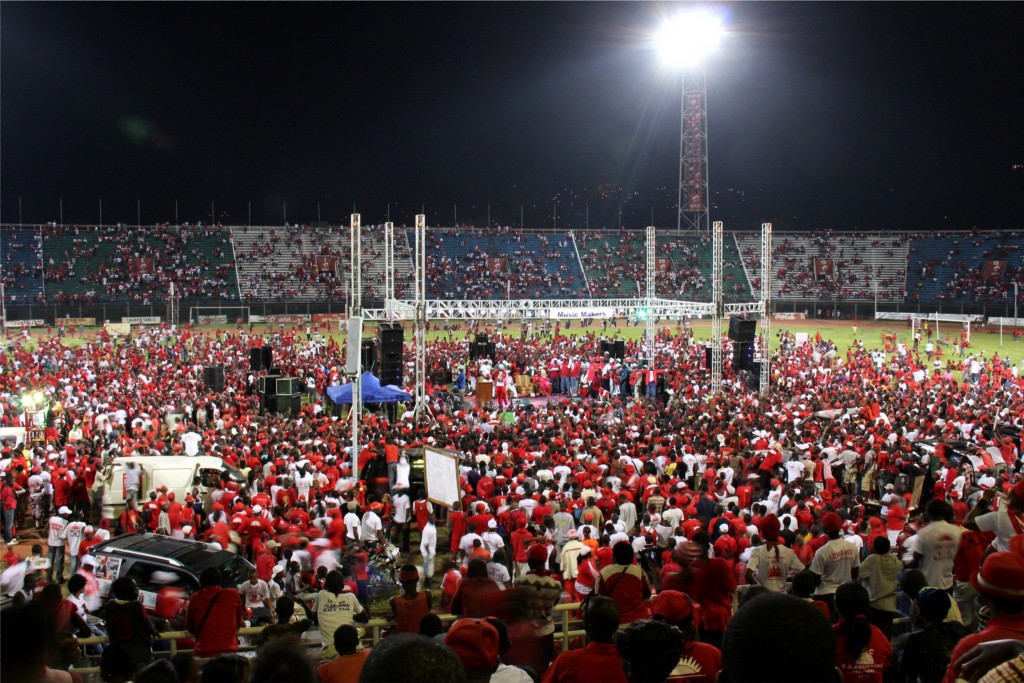
In October 2012, I went to Sierra Leone to cover the elections, the first without a peacekeeping presence since the end of the civil war. I didn’t have to wait long before I ran into Reagan Bush, a man gifted in the art of mocking earnest American writers. I met him in a bar that was just a concrete hutch decorated with warm cans of Fanta and baggies of plantain chips. When Andy and I walked in, looking for a quick lunch on our way into the jungle, we saw two drunk police officers. Before long, the bald, skinny one staggered over to our table.
“Ah, you are American! I love America. My name is Reagan Bush!”
“America kills its enemies,” he said, swaying drunkenly, waving his arms. “China, Russia, France, England, they are all — ” here Reagan Bush kicked the air. “Qaddafi killed Americans. Now where is Qaddaffi?” Reagan Bush slid a finger across his throat. “Osama bin Laden killed Americans! Now where is bin Laden? Where is he?!”
“He’s dead,” I said.
“I support Nick Romney,” he said, “because he says he will kill the enemies of America. Jimmy Carter was a very weak president.” He then named all the US presidents since Nixon, recited their years in office, and considered whether they were strong or weak. “If anyone gives you any trouble, call me. I will kill him,” he added. He wrote down his phone number with handwriting that was admirably neat for a drunk man. After a final round of congratulations, Reagan Bush lurched out into the street.
I had come to Sierra Leone expecting to talk about the country’s civil war, which ended in 2002 and left fifty thousand Sierra Leoneans dead, two-and-a-half million as refugees, and tens of thousands more tortured, mutilated, raped, or forced into battle as child soldiers. Ten years later, this was all old news. Reagan Bush was the rare Sierra Leonean who wanted to talk about war, but not the one that had raged in the forest right behind us.
With elections just a few weeks away, a rally for the All People’s Congress — Sierra Leone’s ruling party — had just begun in the street outside the bar. The APC’s red-clad masses were out in force, a platoon of motorcycle riders at their head. A man with a large belly stood next to us and filmed the parade with an iPad. Andy and I had hoped to meet President Ernest Bai Koroma here in Pujehun Town, since he was friends with one of Andy’s business partners, but he didn’t show up for his campaign stop.
It was the second time that Bai Koroma had stood me up; my first miss was in the National Stadium in Freetown a week earlier, where he was supposed to cap off his parade through the APC-red-suffused city with a speech to thousands of his supporters. I waited for five hours in the half-full stands. One of the richest heads of state in Africa, Bai Koroma was going to explain to us how he would deliver the two major things Sierra Leoneans were asking from politicians during that election cycle: more development and less corruption. Julius Maada Bio, the other credible candidate for president, was a former leader of the military junta that had ruled Sierra Leone during the worst days of the civil war. He was the favorite of the two mead brewers I was staying with, but the word “junta” was enough to tilt my sympathies as an outside observer toward Bai Koroma.
Back in the stadium, a man strung out on something vicious had explained, “Red is the only color we need in Sierra Leone. If we are not having red, we are using this!” He mimed firing an assault rifle. He came back later with a trio of men who danced and sang; I shared some boiled peanuts with them. While we munched, an angry crowd chased a boy who had stolen something along the lower mezzanine. They caught him after he leaped onto the track encircling the weed-grown field. He was shirtless, and his pants were falling off as he ran. The man sitting next to me laughed and said, “They will eventually take him to the police. But first they will have some payment.” He tapped his forearm to indicate a beating.
That was the only violence I saw in Sierra Leone. While the man fled, most of the stadium was patiently jubilant. Stray dogs played on the soccer pitch — five or six tawny speaks rolling in the grass, chasing each other around goalposts.

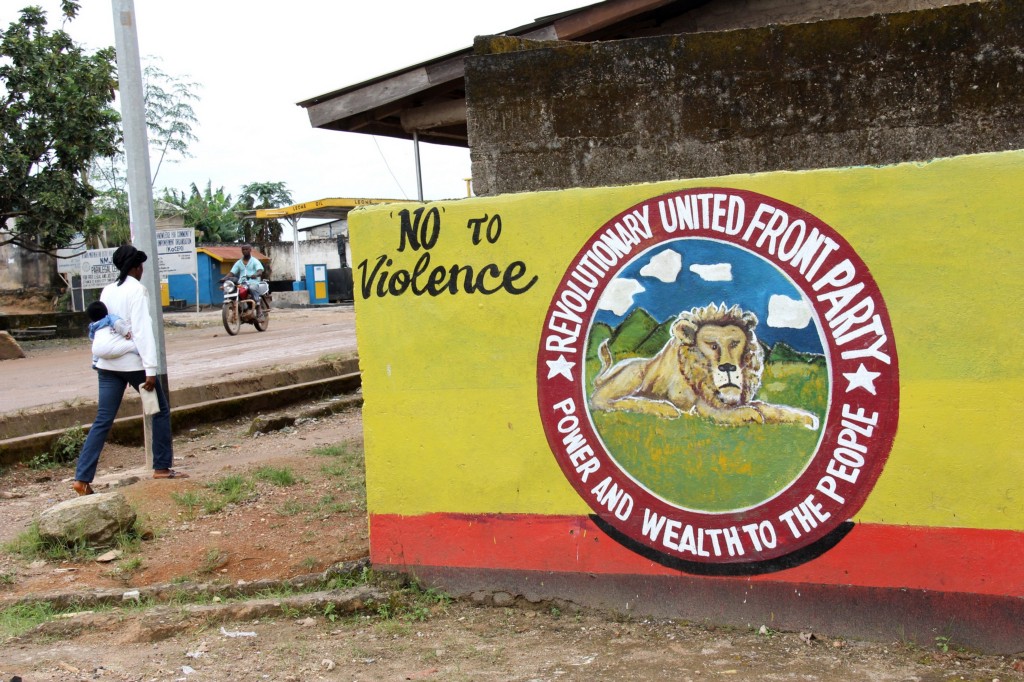
We were on the way to visit Andy’s farm when we met Reagan Bush. Andy and his business partner Ben were part of a wave of “social entrepreneurs” who believe that businesses can solve problems NGO’s can’t, like harnessing the potential of thousands of acres of uncultivated arable land in a country where the average person is undernourished. They had broad ambitions, offering commercial loans to ex-guerilla-commanders who wanted to start farms or sell flash drives. But warlords and animist magicians (one of them famously convinced his men that his electric fan could breeze away bullets) don’t make great debtors, so Andy and Ben switched to farming full time just before I arrived in Sierra Leone. They leased two thousand acres of estuarial wetland on the Liberian border, deep in the bush; two miles away, former South African mercenaries were dredging a river for diamonds.
One of Andy and Ben’s partners in the farm, Exeter, is yet another former bush commando, but he had proven more reliable than the magic fan guy. As he said, “I do not just like doing bad things anymore.” He laughed when he said this. His self-appraisals were always one step ahead of my attempts to get him to talk about the war. Still, he was conscientious about helping me understand the country. Exeter ran the local operations of the APC. After I had been at the farm for a week — mostly reading Thomas Hardy in the shade — he agreed to show me how campaigning works. We shared a motorcycle en route to a “family meeting” — a label used to dodge rules that limit political rallies to certain days — in nearby Sulima. As always, kids we passed on the road ran toward us shouting “Pumwe! Pumwe!” — white man. From the rear seat, I waved a red poster decorated with President Bai Koroma.
The meeting involved a series of men holding forth in impassioned Mende, the regional language, with a lot of gesturing and pacing. I don’t speak Mende, but Exeter told me that the promises were typical — more development, less corruption. Skull-capped old men leaned back and snacked on coconut flesh. Young kids formed a watchful perimeter around the concrete shelter into which the rest of us had crammed. The place was packed, and every time I bumped into someone, I got a smile and an admonition to take his seat, as if I were an honored guest. At the end, a man in a Washington Redskins jersey and a trucker-style APC hat passed out handfuls of five thousand Leone bills (about $1.25) to all of the older men; Exeter said that such “tokens” were a part of any major village meeting, and I shouldn’t glamorize it as buying votes. As we rode back to the farm, I asked Exeter what he thought about the United States.
“I would like to visit there, but I do not want to immigrate.”
I asked Exeter why he felt the way he did.
“Because there you can have a lot of money and not have much power.”
I laughed and said that most rich Americans had enough power.
“Yes, but here you can have only maybe twenty thousand dollars and be plenty rich. In America, if you have only twenty thousand dollars, people will not respect you.”
His numbers were right, so I didn’t have a rebuttal.

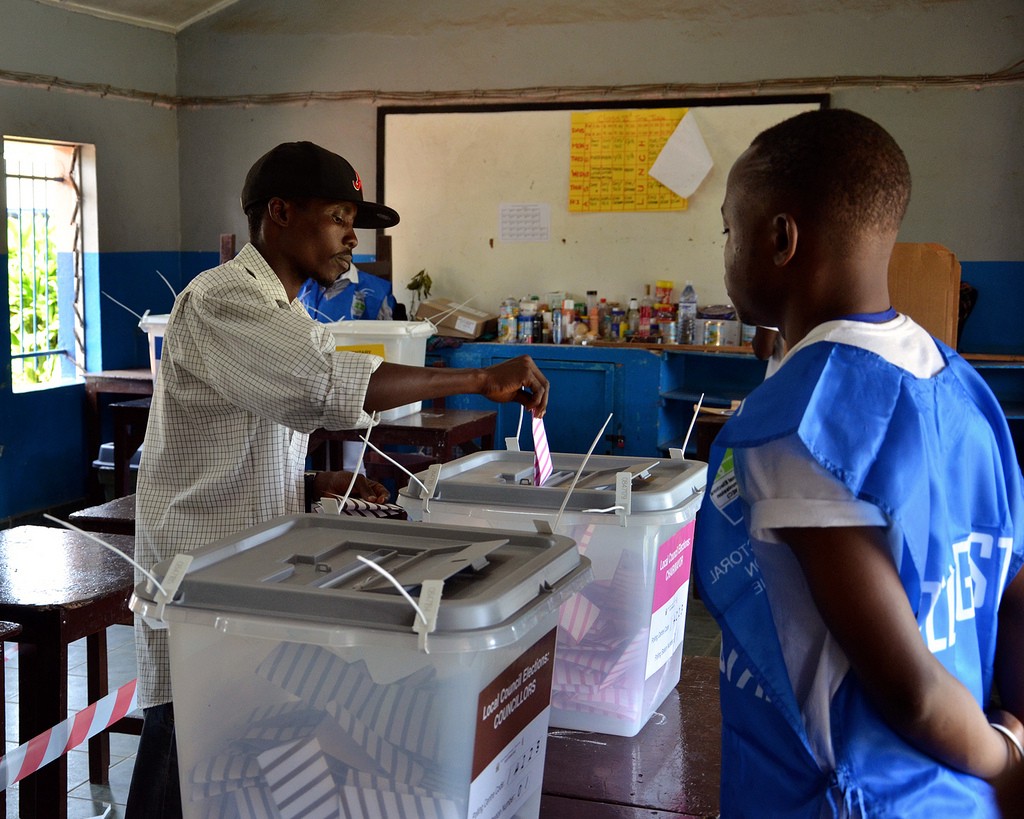
Election Day was a few weeks later, on November 17th. Elections are the crux of a week-long shutdown of the entire country, so with little else to do, Andy and I went to Sulima, a small fishing town, to see what voting looked like in Sierra Leone. In a country still reckoning with a war that had gutted all pretense of civility, civil rights are revered, so turnout wasn’t an issue. This was only the third national election since the war, and it was the first that didn’t have a foreign security presence.
Andy and I decided we wanted a Coke. Exeter, who owned the building that held Sulima’s main shop, had two thirteen-year-old girls open it up for us. They got two cans of Coke out of the cooler, opened them, and took our money. Exeter smiled nervously when he saw us. He wore a studded red shirt over a flowing sleeveless undershirt, his look whenever he wanted to announce that he was a crack APC operative. I struggled to understand what his goals were within the party. Like most Mende areas of Sierra Leone, Pujehun was Sierra Leone People’s Party (and thus Maada Bio) country. APC was the preferred party of the ethnic Temne regions to the North. Ben had explained that Exeter’s gambit was to try to disrupt the SLPP power structure by gaining clout in his own corner of Pujehun. If he could build up his venture with Andy and Ben, he could subvert the SLPP old guard, who didn’t have the backing of American capital. He had designs on one day being the first APC parliamentarian from Pujehun in over a decade.
But on Election Day, flaunting commercial clout mattered less than neutral optics. When we met outside the schoolhouse, Exeter, and I performed the elaborate Sierra Leonean greeting that starts with a handshake, followed by matching palms, then another shake, ending with each man touching his right hand to his heart. Exeter wasted no time warning us off. If anyone from Sulima thought white farmers were interfering on Election Day, there would have been trouble. Exeter perfectly described how even standing around as white guys was a potentially transactional act: “Because we are having voting here, you are with me. These people see you are with me. I do not want anyone to think you are doing anything, having some influence. Sorry.”

One evening at twilight, after I had been in Sierra Leone about a month, Andy and Ben’s employee Bashiru waved the Land Cruiser to a halt. He had caught a monkey in a trap set by the river. The monkey was a baby, too little to eat. Very powerfully built by reedy Mende standards, Bashiru was giddy — he had big plans for his new pet. He wanted to train her to do tricks, maybe even make his living as an entertainer. Maybe this monkey could take him out of the fields. The monkey was tied to a bamboo log by a rope around her waist. She tried to run away whenever Bashiru got near, the rope always surprising her. Bashiru was quick-handed enough to grab her from behind without getting bitten. He laughed and cuffed the monkey’s head when she finally got her teeth into him.
Bashiru brought his prize to the compound the next day. He led her around by the rope, still using the bamboo as an anchor. His style of monkey walking involved a lot of dragging and lifting and swinging in the air. This made an unnerving marionette of the monkey. After showing her off to the workers, he left her anchored in the “carpentry shop,” which was a tarp spread over a frame of two-by-fours. The monkey sat with hunched shoulders, paws curled up on her fuzzy ribcage. The rope was starting to rub her belly raw. You don’t want me to go into detail about her eyes; a monkey’s downcast gaze can be more flattening than a human’s. I knew that all I had to do was cut the monkey’s rope. She would run off into the forest, and probably die there, away from her troop. But I wouldn’t have to sit still and watch her die; when she disappeared into the elephant grass, I could tell myself that I may have been her salvation.
Ben asked Bashiru to take the monkey home, but he didn’t. After a day of smuggling water, fruit, and burned rice out to the carpentry shop, I told Ben and Andy we needed to cut her loose. If Bashiru wasn’t even going to feed his monkey, then we didn’t have to abuse her for him. In the muggy climate, the wounds from the rope wouldn’t take long to become infected and deadly.
Ben and Andy agreed. “I’ll do it,” Ben said, picking up a machete.
But the scene quickly went off-script. Ben swung at the rope while Soni, the farm’s all-purpose domestic, kept the line taut by holding the bamboo anchor in the air. The monkey skittered desperately. She had started to trust me, but now she was back to assuming all humans wanted to whack her with a machete. I convinced Soni to hold the monkey to the ground so I could cut the rope away from her body.
“It’s going to bite the shit out of you,” Ben said to me as I went in for the cut. We found ourselves crouched in the barren middle of the compound — two white kids in a standoff, Soni holding a fistful of monkey. She had scrunched into a stoic ball in Soni’s hand.
“Let it go,” I said.
“Bashiru told me to care for the monkey,” Soni said. “He said to give it salt. If you give it salt, it does not want to go back into the bush.” He clenched his face in disgust at the idea of release.
“Take it back to Bashiru,” Ben ordered.
“We said we were going to release it,” I said.
“Will you pay Bashiru for it?”
“Yeah.”
We managed to agree again. Soni let the monkey go. Dropped, the monkey paused. The shock of liberty beat out instinct. Then Soni rushed at her, waving his arms and shouting curses. She shot up and over the fence. Soni wasn’t happy that we had freed an animal that could have been eaten, even if it wasn’t much bigger than a guinea pig. The average person in Massaquoi II was always hungry. Not starving, but almost never sated. And we had taken something away from Bashiru that he believed would bring him a new livelihood.
Bashiru later quietly asked me for money: “I have heard you have freed my monkey.” He didn’t seem upset. He just wanted a fair rate for the monkey; he set the price at fifteen thousand Leones, or about four dollars. This seemed like a suspiciously low price, even though Soni independently signed off it. I later learned that both were letting me off the hook for less than half the monkey’s proper value.

By the time I was getting ready to leave Pujehun, everyone else on the farm was also preparing for a possible denouement. If the peanut harvest went badly, Andy and Ben were considering selling to Exeter or folding up shop altogether. There were many reasons for this — lack of skilled labor, infrastructure that just wasn’t there, tropical crop diseases. Farming here was more complicated than they expected, in all ways but one: It was simply hard to turn a profit.
One morning as we walked through the village of Follu, rain started to fall. Morning prayers began in the huts. Vandi Hassan, the chief of Massaquoi II, knelt in front of his house. His skullcap stayed still while his hands floated apart and back together again. He bent and touched his head to the ground, chanting steadily.
“Come on,” I said to Andy, “Let’s get going before he sees us.” Most of the times we saw Chief Vandi, we gave him a few thousand Leones or a bottle of eye drops. Gifts. Andy and Ben had to be on Vandi’s good side if they wanted to do business in his territory. Rumor had it that the South African diamond hunters gave an envelope of cash to a different nearby chief every month. Multinational mining companies did whatever it took to secure the favor of the Sierra Leonean elite. If you gave enough to the right people, there was little you couldn’t get away with, a fact that makes Pujehun much like anywhere else.
Ebola’s sabotaging of any current discussion about Sierra Leone probably hasn’t done much to disrupt Chief Vandi’s morning routine. What the virus’s celebrity status means is that there’s a new poignancy to the ongoing need to parse this dynamic — transaction leading to extraction, all the leftover gears of imperialism grinding away. The problem is that we don’t seem to have the first clue what it would mean to act benevolently outside of distinctive moments of crisis — a dynamic often pointed out in critiques of Western relations with African nations. We don’t even know how to care until the bodies have already piled up. At least we then sometimes send money, doctors, soldiers. African countries otherwise remain places we go almost exclusively to get something, whether rare earth minerals or a sense of integrity. Conscience-laundering and mining resources are both lopsided transactions. After winning the deal, we can leave, and wait for the next crisis (which is often the same as the next opportunity).
Even if I acknowledge this failure and try to work it out in writing, the best framework of meaning that I can cobble together still teeters under the weight of the same transactional logic that warps US foreign policy. So maybe I shouldn’t have run from Chief Vandi that morning. Maybe I should have spent more time with him, sincerely trying to do justice to whatever anchors his faith. Maybe then I would have some better insights about how the United States and its citizens could become a more positive force in the lives of Sierra Leoneans. But it’s just as likely that I would have found myself short a few more dollars, the price of creating scenes I could use in another piece.
Some names have been changed.
You Don't Know Jack About Multiple Sclerosis (MS)
by Awl Sponsors
You Don’t Know Jack About MSTM was created for people living with multiple sclerosis (MS) and their loved ones by Jack Osbourne, in partnership with Teva Neuroscience. The vision was to start a new conversation about MS to dispel myths, educate and help patients manage their disease. To bring a personal connection to the program, Jack shares his journey and experience with MS to emphasize the importance of patient and family support and maintaining a healthy lifestyle.
As part of You Don’t Know Jack About MSTM, Jack and Teva created online documentary series, webisodes, to show people that while relapsingremitting multiple sclerosisn (RRMS) is a part of his life, it’s not controlling his life.
Watch the full webisodes, learn more about MS and discover additional resources to help manage the disease at www.youdontknowjackaboutms.com
NEUR40347
